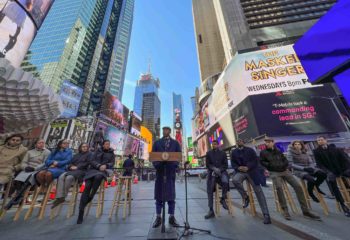
Mayor Adams announces changes to the City’s COVID-19 protocols in Times Square. Image Credit: Michael Appleton/Mayoral Photography Office.
The announcements come after data supports that New York City is currently experiencing low level spread of COVID-19. On March 4, 2022, Mayor Eric Adams announced changes to the City’s COVID-19 protocols in response to the decline of COVID-19 cases citywide. The changes go into effect today, Monday, March 7th.
The Key to NYC rules, which required indoor venues including restaurants, fitness facilities and entertainment spaces will no longer be required to check guests for proof of vaccination. The Key to NYC rules were established by former Mayor Bill de Blasio to encourage New Yorkers to get vaccinated and to slow down the spread of COVID-19. Businesses that were covered under the Key to NYC rules may still choose to require proof of vaccination or masks if they choose.
Mayor Adams also removed the mask requirement for public school grounds for kindergarten to 12th grade students. The requirements will still be in place for all settings with children five years old and under, who are currently not eligible to be vaccinated. Schools will continue to maintain COVID-19 protocols, including a daily screener, test kit distribution and increased ventilation.
All other COVID-19 mandates will remain in effect, including the mandate that requires employees to be vaccinated unless they get a reasonable accommodation from their employer.
With the changes, Mayor Adams announced a new color-coded system to track COVID-19 related alerts that will better help New Yorkers understand the current risk level. The four level system (low/green; medium/yellow; high/orange; and very high/red) outlines precautions and recommended actions and is based on the CDC’s Community Burden Indicator.
The recommended precautions and government actions increase in scale with increasing severity of community spread; at low level, precautions include basic hygiene, getting tested upon showing symptoms, getting vaccinated and consider wearing a mask when in vulnerable settings like health care facilities.
At medium spread, precautions include the previous level in addition to avoiding crowded settings if at high risk and government actions include considering the requirement of face masks in additional high-risk settings like schools where it is generally crowded and social distance cannot be maintained.
At high spread, pressure on the health care system is considered substantial; the recommended precautions include wearing a mask in all public indoor settings and crowded outdoor settings, and recommended governmental actions include requiring a mask in all public indoor settings and increasing testing and vaccination capacity.
At very high alert level, health care services are overwhelmed with COVID cases; the recommended precautions include avoiding all nonessential activities and crowded spaces and maximizing social distancing in all public settings, including workplaces. Recommended government actions at this level include considering restrictions on nonessential activities, and offering telework and sheltering in place to keep essential facilities like schools and health care operating where possible.
The changes come as the City announced more than 17 million vaccine doses had been administered in New York City, and that cases had declined to the point where data indicates that New York City is at low level spread.
Mayor Adams stated, “Two years ago, New York City was the epicenter of the pandemic, but thanks to New Yorkers getting vaccinated and getting boosted we have made tremendous progress. I’ve said time and time again that the numbers and science will guide us as we continue to recover and rebuild, and now New York City is back, and vaccinations are why we’re back. New Yorkers should be getting out and enjoying our amazing city. The fight may not be over, but we’re clearly winning the war. We are open for business and New York City has its groove back.”
Health Commissioner Dr. Dave A. Chokshi stated, “Our new COVID Alert system gives New Yorkers a roadmap for how to reduce their own risk in the event that we see another surge or increase in transmission. COVID Alert will keep New Yorkers informed, including about actions to expect from city government. As we look to the months ahead, we must continue to do all we can to prevent unnecessary suffering due to COVID-19.”
Andrew Rigie, Executive Director of the NYC Hospitality Alliance stated, ““New York City’s restaurant and nightlife industry has been devastated by COVID-19, and over the past two years these small businesses have endured ever changing pandemic mandates that have posed significant challenges to their operations, yet they’ve fought hard to persevere and to feed and serve our city during this time of crisis. Now, with our city achieving a high vaccination rate, a low infection rate, and as we enter the next stage of our city’s recovery, we must continue to be safe and smart, and modify mandates as the situation evolves. That’s why it’s with optimism and the careful consideration of many that we stand in solidarity with Mayor Eric Adams, public health officials, and community leaders to lift the city’s temporary proof of vaccination mandate for indoor dining, as an important step in our resilient city’s revival.”
By: Veronica Rose (Veronica is the CityLaw fellow and a New York Law School graduate, Class of 2018.)

